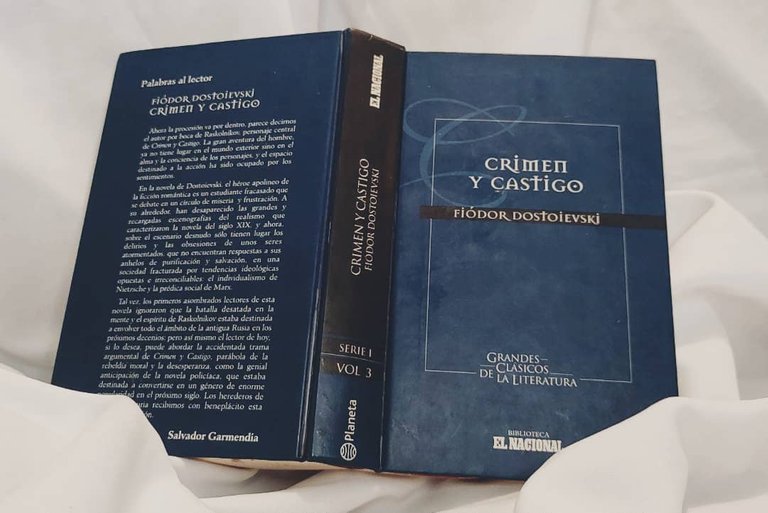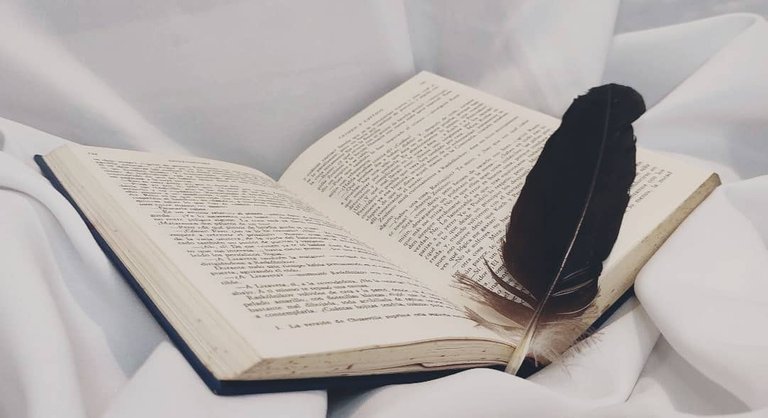
COMO LO ESPERABA, Fiódor Dostoievski sabe ganarse su nombre de escritor; su oficio lo ejerce con maestría, a la altura de los buenos. Desde que empecé a leer Crimen y castigo, no he tenido tranquilidad; cada vez que suelto el libro por alguna necesidad básica, me genera una sensación de angustia; justo ahora que el invierno llegó levantado los techos, he tenido que ocuparme tapando las benditas goteras para que no me llueva más dentro que fuera y eso me ha quitado la holgura para sentarme a leer.
Cuando uno es pobre como en mi caso, pero lector; la riqueza material, no es que pasa a un segundo plano, porque no hay nada más bueno que vivir con ciertas comodidades; un buen trabajo, una buena casa, alimentarse bien, viajar, esas solvencias que te permiten vivir con menos preocupaciones; y agrego yo, tener una gran biblioteca. La lectura te da una riqueza diferente; alimenta tu espíritu, impulsa tu intelecto; leer es viajar en el tiempo y esa forma de viajar representa una riqueza incalculable porque aunque no vayamos físicamente a la Grecia clásica, por ejemplo, podemos saber cómo fue, en su democracia, en sus dioses, con sus guerreros míticos, con sus filósofos; la literatura es una riqueza que no tiene precio; sería un desperdicio incalculable perderse de esto; uno quisiera que todo el mundo fuera lector, pero sería como pedirle peras al olmo como decía Octavio Paz.
Y precisamente, esta riqueza que te da la lectura es la que encuentras en obras monumentales como Crimen y castigo, confieso que me gustan las novelas voluminosas, Don Quijote de la Mancha, Los Miserables, Cien años de soledad, Historia del Rey Transparente, y otras muchísimas otras; me gustan porque no solo cuentan la historia de un personaje, de alguien que va en busca de un objetivo, que quiere alcanzar una meta, y bueno, hay alguien que se le interpone; novelas con tramas descomunales, de las que podemos conocer contextos históricos particulares porque toda historia ocurre en un lugar y en una época determinada. Esas obras, cargadas de simbolismos, de épocas pasadas que ayudan a entender el presente; culturas que se anexan a nuestro bagaje cultural; eso es leer, refigurar vidas, conectar la existencia con aquello que pasó, para no sentirnos desamparado porque al leer, le encontramos sentido a nuestra soledad.
Apenas voy en la primera parte, empiezo a conocer al protagonista, Rodión Raskólnikov, un estudiante de la Rusia Imperial venido a menos por su pobreza, pero que se cree de una raza superior. Asistimos a la narración de un círculo de miseria y frustración; delirios y obsesiones de personajes atormentados que buscan respuestas en una sociedad fragmentada por las ideologías y el individualismo. Una obra publicada por primera vez en 1866, pero que me va refigurando un presente muy parecido.

Literary pleasure, in Crime and Punishment
AS I HOPED, Fyodor Dostoevsky knows how to earn his name as a writer; he exercises his craft with mastery, at the height of the good ones. Since I started reading Crime and Punishment, I have had no peace of mind; every time I put the book down for some basic need, it generates a feeling of anguish; just now that winter has lifted the roofs, I have had to occupy myself with plugging the blessed leaks so that it doesn't rain more inside than outside and that has taken away the slack to sit down and read.
When one is poor as in my case, but a reader; the material wealth, it is not that it passes to a second plane, because there is nothing more good than living with certain comforts; a good job, a good house, eating well, traveling, those solvencies that allow you to live with less worries; and I add, to have a great library. Reading gives you a different richness; it feeds your spirit, it drives your intellect; reading is traveling in time and that way of traveling represents an incalculable richness because even if we do not physically go to classical Greece, for example, we can know how it was, in its democracy, in its gods, with its mythical warriors, with its philosophers; literature is a priceless wealth; it would be an waste to miss out on this; one would like everyone to be a reader, but it would be like asking for pears from the elm tree, as Octavio Paz used to say.
And precisely, this richness that reading gives you is what you find in monumental works like Crime and Punishment, I confess that I like voluminous novels, Don Quixote de la Mancha, Les Miserables, One Hundred Years of Solitude, History of the Transparent King, and many others; I like them because they not only tell the story of a character, of someone who goes in search of an objective, who wants to reach a goal, and well, there is someone who gets in his way; novels with huge plots, from which we can learn about particular historical contexts because every story takes place in a certain place and at a certain time. Those works, loaded with symbolisms, of past times that help us understand the present; cultures that are annexed to our cultural baggage; that is reading, refiguring lives, connecting existence with what happened, so that we do not feel helpless because when we read, we find meaning to our loneliness.
We witness the narration of a circle of misery and frustration; delusions and obsessions of tormented characters looking for answers in a society fragmented by ideologies and individualism. A work published for the first time in 1866, but that is refiguring me a very similar present.


Texto e imágenes de @jesuspsoto
The rewards earned on this comment will go directly to the people sharing the post on Twitter as long as they are registered with @poshtoken. Sign up at https://hiveposh.com.
Creo que es una de las mejores obras de Fiódor Dostoievski, uno de esos clásicos que no obstante, a pesar de que pasan los años, tiene un realismo siempre actual.
Recuerdo El Idiota y Los Hermanos Karamazov del mismo autor.
Gracias por compartir esta excelente reseña @jesuspsoto.
Saludos.
Hola, es la primera obra que leo de este autor, sin duda que es buena. Gracias por leer y comentar.